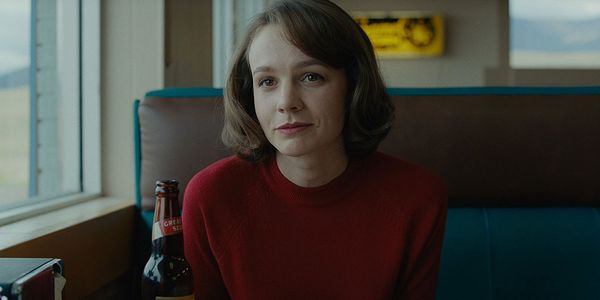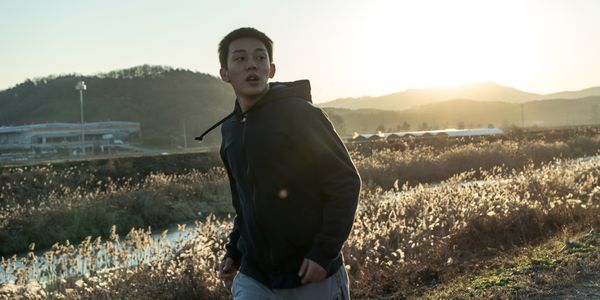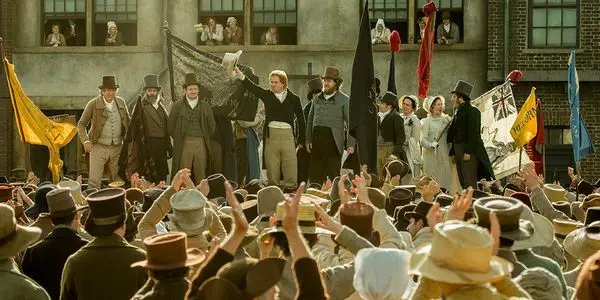Toronto International Film Festival 2018 Report Part 1: Wildfires & Those Burning Desires

Tomas is a chronic cineaste who studied English literature in…
Yes, I am back. I am Emma Thompson in 2013, getting out of her taxi on the red carpet and shouting “TIFF! TIFF! It’s TIFF! HELLOOOOOO!!!” to her adoring fans. I think about that iconic moment of realness the night before my TIFFing begins in earnest, and my only wish would be for someone to scream back. Because, as you know, I do not have adoring fans. I write to you people with the hope that my thoughts are adequate enough for your time.
This outlet is not as big of a name as others. I am not a Twitter personality that people gravitate around and hope to shake hands with someday. I can bet you ten dollars that no one knows my name as I hightail it from one musty cinema in Ye Olde Scotiabank to another. I am An Anonymous Film Critic, much like many others out there who pray their words reach the widest audience possible. I can only do so much. Say so much. Be so much.
So, for all my travails, all my hours of lost sleep, all the food I did not eat, please know that my intentions are good and my regrets are few. Okay, okay. Let’s hold off on that last part until I end up missing a major screening like A Star is Born or something. Then we can talk about regrets. The first part is still true, though. I intend to give you some darn good coverage of this year’s Toronto International Film Festival, and unlike last year, I’m going to try my hardest to do it before October. Because who wants to read my thoughts on the latest Jodie Mack film in October? Let’s not kid ourselves here.
Expect most of my dispatches to get to you before the festival is out. If not, then you have my permission to lob moldy Timbits and Beaver Tails at me.
My goodness, what the heck do we eat in Canada these days?
Wildlife (Paul Dano)

It is tempting to watch Paul Dano’s directorial debut while simultaneously recalling the pastoral beauty of Montana as registered by Kelly Reichardt in her 2016 film Certain Women: that majestic mountainous landscape that peacefully hugs the essence of small-town Americana, where quiet lives begin to brim with untold potential. This is the vibe Dano strives to replicate in Wildlife, and I’d say he does a very good job of it. Obviously he is not as seasoned as Reichardt, and won’t be for awhile. The veneer of a first-timer is still evident in the film’s patchwork, which leans too much toward the imitative, making it difficult to really find Dano’s voice amongst the hushed tones and self-conscious placidity.
What he does best is pay generous attention to his characters: namely, the Brinson family, which consists of father Jerry (Jake Gyllenhaal), mother Jeanette (Carey Mulligan) and son Joe (Ed Oxenbould). The film revolves around their financial precariousness when Jerry loses his cushy job at the local golf club and refuses menial labor out of principle, as it would wound his pride otherwise. It’s 1960, though, and rural Montana doesn’t have much to offer. Jeanette becomes a swimming instructor to help keep the bread flowing, but in the end, it’s not enough to keep Jerry around. He decides to help fight the local wildfires and abandons his family outright.
When Jerry leaves, the film focuses on the aftershock in Jeanette and Joe’s lives. The former begins to simmer with resentment at being left to fight her doldrums, and decides to find love elsewhere. The latter, forced to watch the dissolution of his parents’ relationship, must act with a maturity belying his youth to keep his own life from suffering the same fate. Both Mulligan and Oxenbould deliver sterling performances here, tapping into wells of volatile and contradictory emotions that threaten to detonate in the frostbitten air. Mulligan, especially, is given a chance to shine, as her flinty character heaps many personal revelations about her thwarted dreams and ambitions onto our laps. And she does it with a fine crackle of acrimony and ennui.
The crisp, elemental qualities of Wildlife (not to mention the symbolic mention of the elements within the narrative, with each character representing either earth, air, water, or fire) give it a pleasing starkness that slowly transitions into something more emotionally-wrought. Again, Dano’s lack of a truly individual style is what keeps the film at a bit of a remove, but for a first outing, he can walk away gratified that things turned out as well as they did.
Non-Fiction (Olivier Assayas)

In Olivier Assayas’ last film, he had Kristen Stewart texting with a ghost in a wonderful meditation on the intersections between personal grief and modern technology. Now, in Non-Fiction, Assayas continues to comment on the technological age with something decidedly much less eccentric: a comedy of manners set in the world of novelists and publishers, where the war between digital connoisseurs and “hardback” traditionalists is still being waged with aplomb. Debates about the consumption of art in the digital world, where tablets, audiobooks and e-readers rule the day, open the film with a bracing barrage of intellectual assiduity. The dialogue is spun fast and sharp, and while it sometimes does feel like an older generation railing against modernity, the insights are fascinatingly dense and incisive.
It is, moreover, the kind of discussion that hits close to home, as I have a Master’s degree in English literature and work as a business administrator for a cultural newspaper that’s losing subscribers every month. The conversations about the demise of print media at the expense of online blogs and pixilated content is something that I can be invested in, and so this film, in turn, was nourishing me at exactly the right time. Whenever Assayas focused on his characters dishing out their positions, and then defending them against skeptics, I was utterly attentive, leaning on every word (so much so that I forewent writing in my notebook, as I didn’t want to miss a single subtitle).
I would love it if I could call Non-Fiction a perfect film, since it’s so in tune with my sensibilities. The reason it’s not is in the more comedic portion, when the characters divest themselves of their educated rigour and begin finding themselves in silly romantic entanglements. The leads, Guillaume Canet (a publisher) and Juliette Binoche (his wife), have secret affairs, and it turns out that the latter’s affair has been with a shabby writer (Vincent Macaigne), who has extensively detailed it in his latest book. The frothy plot begets a few excellent gags, such as a recurring reference to Michael Haneke’s The White Ribbon and a metafictional shoutout to Binoche herself within the film. But it feels largely dissociated from all the talk about art’s digitization and democratization, as though Assayas was forced to make his characters do something other than just sit around and debate each other.
The slightness of the romantic subplots does make Non-Fiction more minor than it ought to be, which is a shame, considering its intellectualism has a lot to offer an invested audience. But calling it a misfire would be way off the mark, too, as the humor is still very effective. So let’s compromise and say that it’s an uneven venture that remains thoroughly entertaining all the same.
Burning (Lee Chang-dong)

Critics have hailed Lee Chang-dong’s Burning as a masterful achievement when it debuted at Cannes in May. That alone was enough to secure it a spot on my “must-see” list. So imagine my disappointment when I walked out of it less enthusiastic than I thought I’d be. I do think it’s a very good film overall, laden as it is with socioeconomic subtext and a brooding menace that circumvents some of the (admittedly) glacial pacing. It’s a film, after all, about youth disenfranchised from the common labor market, drifting aimlessly in a kind of reverie that involves seeking out their ultimate purpose (or, as the film’s primary female character, Hae-mi, puts it, “the Great Hunger”). What Burning makes plain is that such a reverie can take on a dangerous volatility if it bumps up against privileged excess, and that excess is, in turn, itself dangerous because it’s not grounded in a moral framework. Like two predatory tigers growling at each other in the same cage, there is no salvaging the remains once the inevitable happens.
The film’s structure bifurcates in the middle, starting out as a burgeoning romance between an itinerant young worker named Jong-su (Yoo Ah-in) and a former classmate he happens to run into one day, the aforementioned Hae-mi (Jeon Jong-seo). She heads to Africa for a while, and when she returns, she has a cool customer by the name of Ben (Steven Yeun) at her side. Ben is wealthy and distant (he claims, for instance, that he has never shed a tear in his life), and what’s more, he has a curious hobby of setting greenhouses on fire every so often. When he tells Jong-su that more arson is imminent, the film switches into a more sinister key, as Hae-mi inexplicably vanishes and no one has any clue as to her whereabouts.
Lee seems to pay homage to classics like L’Avventura and Vertigo here, with his own choice inversions that give the tale homoerotic undertones that are not unwelcome. With Hae-mi out of the picture, Jong-su begins to obsess over Ben’s possible involvement in her disappearance, and the film’s tension is ratcheted up accordingly. Lee still keeps a tightly modulated control over the proceedings, so that the shock of the ending remains visceral in spite of its predictability. If anything, the way he controls our switchboards with such efficacy is why the film lands as well as it does.
My main point of contention is that Burning comes out looking somewhat behind on the times. Its interest in the psychosexual makeup of its male characters comes at the expense of its women, who are either removed from the story outright, or are relegated to thinly-written background characters. In the #MeToo era, I’m beginning to find stories like this rather out of touch, and as this film is based on a short story written in the ‘90s by Haruki Murakami, I have good reason for thinking so.
Certainly, that’s not to say we should stop filming these kinds of stories outright. It’s more to do with being generous with female characters and being aware of their interiorities, and this film (barring an admittedly stunning scene of Jeon dancing silhouetted against a setting sun) doesn’t do that very often. And when you have your main characters exhibit some blatantly misogynistic tendencies on top of that, you can understand why my appreciation came to be more muted than anticipated.
Peterloo (Mike Leigh)

If you don’t know your history, you’d be easily fooled into expecting Peterloo to be an epic war film, what with its etymological echoes of Waterloo (not the ABBA song, thank you). It isn’t, as you’ve probably guessed. No, Peterloo was actually a terrible massacre that occurred in Manchester in 1819, when cavalry officers charged into a crowd of demonstrators and political reformers, killing fifteen and injuring hundreds more. Outside of the UK, the massacre is a relatively obscure historical footnote, and with his latest effort, Mike Leigh aims to change that and bring its relevance into the modern age.
As Leigh is wont to do, of course, his approach is hardly modern in any sense of the word. The film is long, for one, clocking in at almost three hours. The massacre only takes up the last forty minutes or so, and when the action gets going, it seems to end before it even begins. So I can understand why many critics are perplexed by Leigh’s choices here, for surely such a momentous national tragedy deserves something more apropos in terms of cinematic representation? Something, perhaps, more sweeping in scope? More aggressively charged and energetic in pulse?
That would be true if the film were only interested in depicting the massacre itself. Leigh, on the other hand, is not. His modus operandi here is in charting the galvanization of civil reform through the powers and tactics of oratory and rhetoric. How our generously pliant language is the discursive tool that knits together loyalties and common ideals, and how it can also be overused to the point of exasperation. The best orators, as we see in Leigh’s work, are those that tow the fine line between the florid and the forceful, and, more importantly, those that have an intuitive understanding of the people they’re trying to convince.
It is lucky Leigh was able to cast Rory Kinnear in the role of radical speechmaker Henry Hunt, because it is Kinnear’s performance that best emblematizes the virtues of Peterloo. In the film itself, Kinnear’s Hunt is spoken of dismissively due to his plain looks and somewhat haughty demeanor, and one can sense Leigh already foreseeing his critics dismissing the film in much the same vein. But when Kinnear opens his blessed mouths and speaks, what mellifluously booms out is the clarion call for unity and action that underpins the film’s political import. His voice and linguistic mastery is the rivet on which the fulcrum of Peterloo is set, and Leigh doesn’t seem to mind it if it’s not enough for some. He has always been a filmmaker keen on telling stories his own way, with few compromises, and if you don’t stand on his wavelength, there’s little you can do.
Fortunately, I’ve yet to fall out of Leigh’s wavelength. Peterloo, while not ranking among his greatest efforts, is still a deeply majestic and intelligent work that reconciles the words and actions needed to make political upheaval possible. View it in this light, and you’ll get your money’s worth. View it as strictly an exercise in banal historical recreation and you’ll miss the point completely.
Toronto International Film Festival: Next Time
Coming to you hot and fast will be takes on the latest by Ciro Guerra, Brady Corbet, Roberto Minervini and Peter Strickland. From murderous red dresses to grotesque pop messes, you’ll be in for a treat.
Which TIFF film would be the first to go on your schedule? Let us know in the comments below!
The Toronto International Film Festival runs from September 6th to the 16th.
Does content like this matter to you?
Become a Member and support film journalism. Unlock access to all of Film Inquiry`s great articles. Join a community of like-minded readers who are passionate about cinema - get access to our private members Network, give back to independent filmmakers, and more.
Tomas is a chronic cineaste who studied English literature in university (in both the undergraduate and graduate levels), and hopes to pursue a career in writing. His passion for film began in earnest at the beginning of the 2010s, and since then he's been reveling at the vast horizons of the cinematic landscape like a kid at the proverbial candy store.













